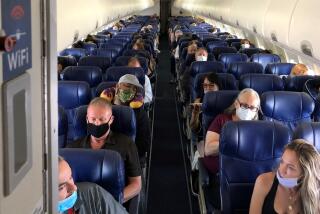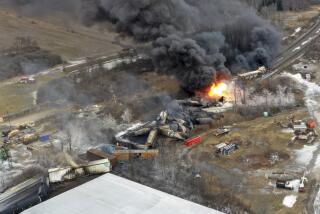Give Air Travelers a Fighting Chance Against Terrorism
- Share via
The morning of Dec. 21 was a busy and joyful time for my family and me as we prepared to welcome home our 16-year-old daughter, Melina. She had been studying in England as an exchange student. By afternoon our joy had turned to grief as news of the crash of Pan Am Flight 103 reached us and 257 other families with loved ones on board. The nightmare of this experience has forced me to focus on the basic questions: Why? How could this happen? Could this tragedy have been prevented? How can we protect ourselves from airline bombings?
Grief is a hard emotion to penetrate, but the revelations that followed in the days after the disaster were more than penetrating. The Federal Aviation Administration had issued written alerts detailing specific terrorist bomb threats to Pan Am, the State Department and the U.S. military. Some people heeded these warnings and avoided Pan Am flights out of Frankfurt. The flying public, however, was not warned.
Security measures that we had assumed were at least adequate to detect bombs in luggage were either ineffective or not used. We now know, as terrorist groups already knew, that X-rays cannot detect plastic explosives. Luggage is usually not searched by hand except on El Al, the Israeli airline. The FAA has known of this situation for at least two years, and has had new machines developed to detect such bombs, but no adequate interim security measures have been adopted. The new machines, called thermal neutron devices, reportedly will not be available for another 20 months. Any doubt about the ineffectiveness of current airline security measures was erased last month when American and French news teams sent five fake bombs through the system and only one was detected.
Several, perhaps as many as half a dozen, terrorist groups are known to operate in Europe with both the capability and at least the general intent of carrying out such attacks against American citizens and civilian aircraft. Three months ago a cache of plastic explosives and detonator devices was discovered in West Germany, but members of the group believed to be responsible were released for “lack of evidence.”
Given all this, and the fact that the perpetrators of the Flight 103 bombing are still at large, how can we have any confidence that such tragedies will not be repeated? While there are no perfect solutions, there are some common-sense responses that could minimize the chances of a bombing attack on Americans abroad in the months ahead:
- Until new plastic-bomb detectors are available, all baggage--both checked and carried--on overseas flights to or from the United States must be hand-searched as well as X-rayed. This will probably require that passengers check in one to two hours earlier than at present; there appears to be no other choice if security against bombings is to be meaningful. Also, cargo that cannot be effectively checked should not be carried on passenger planes.
- Terrorist warnings or alerts issued by the FAA must be available to the public as well as to the airlines and government. It is possible to do this without causing panic or bringing all air traffic to a halt. The FAA should set up a toll-free 800 number for travelers to call for information on such alerts, warnings or threats so that the public can make its own decisions. According to the FAA, there are about 500 threats or warnings each year--a relatively small number, considering the tens of thousands of flights.
- The U.S. government and the American people must come to realize that terrorist attacks against us are not just isolated criminal incidents. They are a form of guerrilla warfare--one that we must learn to fight and ultimately to win.
We cannot effectively fight, much less win, this or any other war by relying only on the police and the courts. Hostile nations and international organizations sponsor and protect terrorist groups and are not amenable to control by our criminal-justice system. Our intelligence and international law-enforcement agencies must make it a priority to learn how to track these groups and take preemptive protective actions when appropriate. People who wouldset up bomb stockpiles cannot be released for “lack of evidence” when apprehended. Nations that sponsor terrorist war against American citizens cannot be allowed to escape detection and severe sanctions.
Had these three points been operative, would my daughter and the other passengers of Flight 103 be alive today? I don’t know for certain. But I do know that with my daughter’s death part of me died with her. My 18-year-old son expressed it better than I can when he wrote, “Melina’s death along with the other 274 people shredded our hearts, but the heart is a muscle and it rebuilds itself only stronger.”
More to Read
Sign up for Essential California
The most important California stories and recommendations in your inbox every morning.
You may occasionally receive promotional content from the Los Angeles Times.












